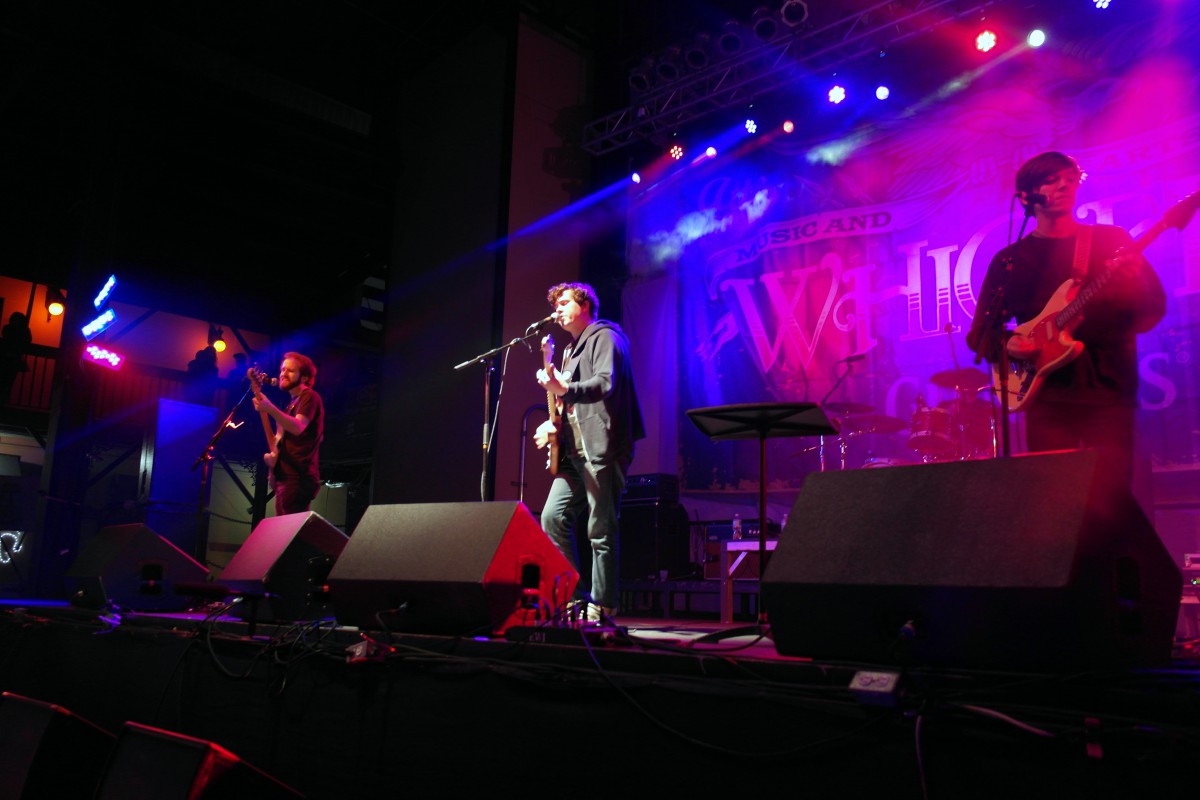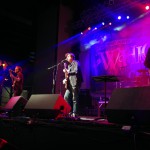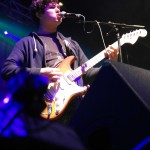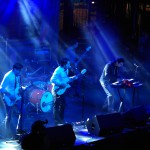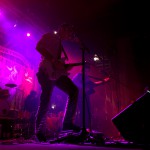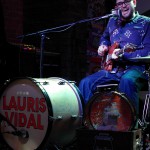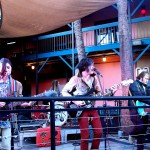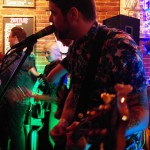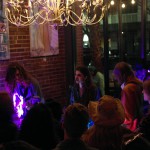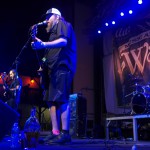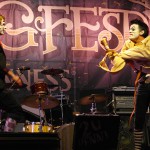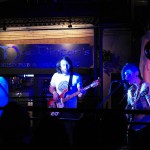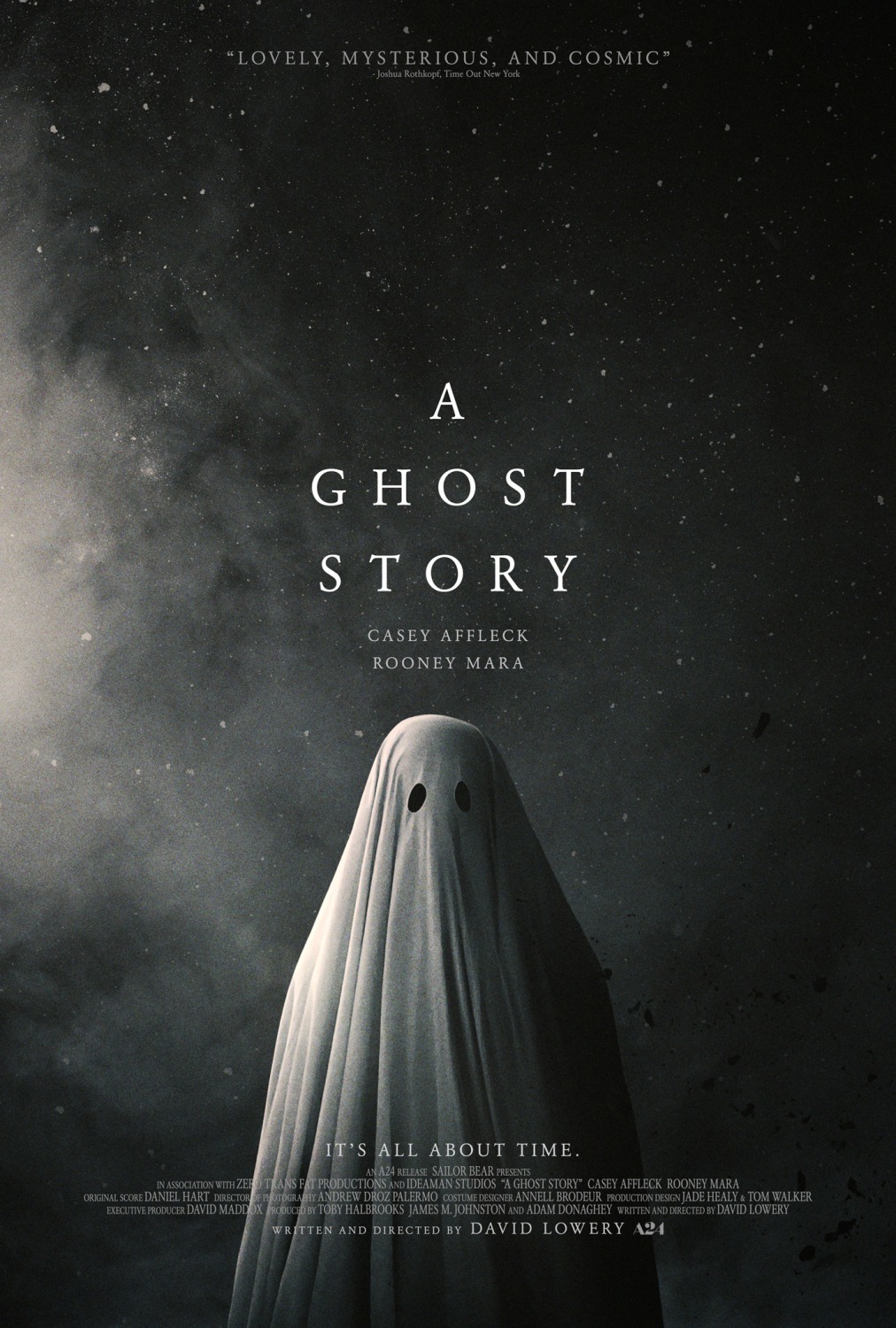

In its second year, Whigfest Music and Arts Festival, put on by St. Petersburg record label Attic Records over President’s Day weekend, effectively channeled the energy of our country’s early rebels to revolutionize the local festival scene.
Anchored in the courtyard at Jannus Live, the festival opened up to three surrounding venues, MacDinton’s, Mandarin Hide and Ringside Café, conveniently placing nearly 50 acts # both local and national # across five stages in two days.
Here’s a look at my Whigfest weekend.
Day 1:
2:50 p.m.
Walking down Central Avenue, I can already hear a folksy rhythm coming from up ahead. I peek through the window at Ringside Café and see bagpipes. Oh boy. I stop by will call to get my credentials before looping back around to check out Boxcar Hollow. Unfortunately, I have missed the portion of their set that includes bagpipes. I hang out anyway for the band’s mix of country and classic rock, which is equal parts twang and electric, and take in the new scenery at what was formerly the slightly seedy re-attempted Detroit. It’s not much different, but I’m glad Ringside found a new home.
3:30 p.m.
Luxury Mane is playing at Mandarin Hide. The groovy St. Pete three-piece, lead by Billy Summers (who, in his plastic-rimmed glasses and white resort wear slacks, reminds me of an adorable mix of Rivers Cuomo and Austin Powers), spew electric riffs that seem larger and more intricate than the band’s size should allow. Each tune is catchier than the last. The echoing treatment on Summers’ mic adds texture to his vocals, but the music is loud and he’s only partially audible. I’m not sure how anyone is managing to order drinks over the sound.
4:40 p.m.
After a quick burrito break, I stop in MacDinton’s for Lauris Vidal. The place is packed, but considering the overwhelming number of soccer uniforms and cleats, I assume Vidal isn’t fully responsible for the crowd. (Both MacDinton’s and Ringside have remained open to the public, but not Mandarin.)
Vidal goes on about 15 minutes late. Playing guitar, stomping on drum pedals (with pink polka-dot socks) and singing, he’s essentially a one-man band. I’ll admit that after listening to his self-dubbed “kitchen sink beat blues” (which I found to be quite accurate of a description) online, I didn’t expect him to be so young and hip.
His grainy vocals are full of soul. His energy and stride behind both a guitar and drum kit are reminiscent of Ray Charles behind a piano # impassioned and buoyant. He boasts his East Florida roots not only through his down-home sound but with plastic mesh Florida Citrus Fruit bags covering his amps.
Vidal handles his electric guitar like a banjo, usually plucking individual strings instead of chords # pick-less. For a few songs, he trades his guitar for a squarish-shaped ukulele, which I later learned is more commonly referred to as a cigar box uke.
5:30 p.m.
I missed the memo that Danfield bailed (not sure what happened there) and walked into Ringside to see hip-hop collective the Real Clash soundchecking. By this point was I was in need of a break from the folksy indie rock genre that consumed this festival # but not one this drastic.
I walked back into Jannus to catch the last 30 seconds of the Americana/folk Applebutter Express’ set, which I’m sure was lovely, based on prior experience.
As I waited for the Heavy Metals to go on the Attic Stage (the smaller stage toward the back of the Jannus Live courtyard), “Freebird” started playing from outside somewhere, much to the delight of St. Petersburg’s homeless, I’m sure. (Disclaimer: I’m not stereotyping; I’ve somehow been to multiple outdoor shows where homeless people walk up and request Lynyrd Skynyrd. Guess I’m just lucky.)
I notice the Heavy Metals’ sideburn-sporting frontman looks familiar and realize it’s Shawn Kyle from the Beauvilles, Florida Kilos, the Laurel Canyon and possibly a few other bands I’m not cool enough to know about. While it may be too obvious a comparison, his vocals could almost compete with Caleb Followill’s of Kings of Leon.
The band’s name is only half ironic. While they aren’t metal, they do play heavy ‘60s influenced rock with a hint of grunge.
6:30 p.m.
Relieved to escape the chilly wind, I head to Mandarin for Archaic Interest who are playing their fuzzy psychedelic surf-rock to a packed crowd. If it wasn’t for the instruments, it’d be hard distinguish the band from the audience, not only because of the intimate stage set-up, but because of the thrift-chic, shaggy-haired style everyone seems to share. There is also an unusually high number of hats being worn. The crowd grooves and bobs as one, clustered toward the front of the venue.
I head back outside for the 20 Penny Circus, not knowing what to expect. Two men with dramatic facepaint somewhere in between mime and juggalo are on stage. One shoots a staple gun into the other’s temple. Next, they race to escape from rope and a straight jacket, which is unimpressive but still executed in an entertaining way. As far as I know, this was the only non-musical act of the festival. It would be nice to see more performance art and theatrics in the mix, since art is part of the event’s foundation.
Wanting to stand my ground before the sardines pile in, I return to Mandarin and wait for Zulu Wave. From the very beginning of their set, their fast, hard experimental rock can hardly be contained by Mandarin’s tiny stage area. Whatever stigmas bassists have earned for being mellow are shattered by Brian Schanck’s franticness as he and guitarist/vocalist Michael Barrow compete for space with Mandarin’s massive crystal chandelier. There’s at least one close call involving the neck of Barrow’s guitar. (Catch Zulu Wave this Saturday, Feb. 22, at Green Bench Brewery!)
9:30 p.m.
I take advantage of the VIP status that came with my press credentials and head upstairs to the balcony at Jannus (I’ve always wanted to go up there). Greenhouse Lounge is playing the Attic Stage, using a Macbook as one of their instruments. It’s a listenable mix of house music and alt-rock, but not really my thing.
St. Pete’s indie rock Polyenso (formerly Oceana, a post-hardcore band) is a little late getting on the main stage and some chick in a black leather corset is at the mic commanding audience members to shake their rumps. I decide not to question it.
The band plays their ambient, grooveable tunes to a loosely packed Jannus courtyard, embellishing standard rock band instrumentals with a trumpet. Vocalist Brennan Taulbee’s clear voice eases into a pretty falsetto. Though not the most energetic of performers, their set induces a nice sense of calm after a long day.
Indie rock band Surfer Blood, who are from West Palm Beach but hold national recognition, close the night. They mostly play tracks off their latest release, Pythons, which is less surf but more chill than their debut album. Crowd favorites such as “Floating Vibes,” along with some new material are also mixed in. Frontman John Paul Pitts joined the audience at one point to sing with his arms around fans before crawling back on stage. (See Surfer Blood perform “Weird Shapes” here.)
Day 2
Note: I spent my day going back and forth between the festival and campus to edit this week’s print issue of The Crow’s Nest, so day 2 coverage is a bit more sparse.
3:18 p.m.
While searching for a parking space I see Mark Etherington, a.k.a Mountain Holler, walking across First Avenue N. He’s supposed to be on stage at MacDinton’s. Hmm.
Luckily, this means his set won’t conflict with the Wholetones on the Attic Stage, who are already in full swing by the time I walk through the gates. I saw the so called “folkcore” band, who play momentous folk/bluegrass music in the style of heavy metal, for the first time at last year’s Tropical Heatwave. When they covered Modest Mouse’s “Bukowski,” I fell in love. But if they included that one in today’s set, I missed it.
For a few songs, the drummer abandons his kit for a washboard adorned with everything from a mini xylophone to a cowbell. Every instrument, including a banjo, mandolin, guitar, double bass and cello (some patched up with duct tape), is played fast and hard # each band members’ hands moving at impossible speeds to pluck, strum and bow.
They’ve drawn a sizable crowd. Some audience members jig ironically.
In the midst of a progressive, building beat, a friend delivers terrible news. Mountain Holler didn’t play because he lost his voice. Sadder words have never been spoken. Word is, he’s drinking tea in hopes of recovering in time to play with Red Feather later.
4 p.m.
The gap between the Wholetones and Tides of Man lasts no more than 90 seconds, in what may be the smoothest lineup transition in history. The all-instrumental Tampa band hits the main stage with its eerily euphoric progressive post-rock. Tampa Bay has produced its share of decent post-rock and post-metal bands, Set and Setting and Red Room Cinema to name a few, yet Tides of Man weave an equally intricate, layered sound in a way that seems easier and less processed. Still, as I stood just feet from the stage, I felt the fabric of my pants vibrating from the bass.
Until 2010, Tides of Man was more of post-hardcore/metal band (sort of Circa Survive meets Pierce the Veil … oof) lead by singer Tillian Pearson. They released their first album as an instrumental post-rock outfit, Young and Courageous, earlier this month.
I duck in Ringside to hear Alexander and the Grapes play a few sad indie rock songs to a packed crowd before heading back to campus for a while.
7:30 p.m.
Red Feather is scheduled to play Mandarin and I’m curious to see if Etherington’s voice has recovered. While it’s not all the way there, he toughs it out through the band’s earthy, haunting tracks. Putting Red Feather in Mandarin was a terrible idea. Actually, cramming any notable band from St. Pete’s music scene into the bar’s tiny corner of stage area is a mistake. (I shared my sentiment with a fellow observer later on and she suggested they put the solo acts in Mandarin instead of the spacious MacDinton’s # a beautiful solution.)
Though I can’t see the band and can hardly hear Etherington’s hoarse ooh and ohhs, the crowd seems content. Some are standing on Mandarin’s benches to see. I got scolded for doing that last night.
Though he still musters moments of whimsical deliciousness, Etherington’s voice has had enough by the final song. Fortunately, the crowd is comprised of Red Feather’s most loyal fans, who carry the lyrics on their own. I catch a glimpse of Etherington’s face and he looks humbled, if not relieved.
Sons of Hippies, perhaps the most psychedelically hip of all the psychedelic hippie bands here, are on the Attic stage, where the faint aroma of marijuana that has lingered all day suddenly becomes more pungent. The uber punk Katherine Kelly shreds her electric guitar while breathily shouting and moaning her punchy vocals. The trippy, neo-psych Tampa four-piece delivers the most theatrical and spirited performance of the night.
9:30 p.m.
I make it back to Jannus a few minutes before Pinback comes on. The courtyard has thinned out, but a few hundred people remain. Since neither headliner attracted much of a crowd, I’d say Whigfest has some work to do if it ever wants break the mold as a merely a local festival. Overall though, it seems to have been well-attended.
Pinback goes on at 9:54. Three to four rows of dedicated fans pack themselves toward the front, singing along to the songs they recognize.
Whigfest producers did a lot of things right this year. The venues are perfect. Each stage can be accessed from the Jannus Live courtyard and it’s nice to get a break from the 600 Block area that usually hosts the local indie scene. In terms of expanding, an outdoor stage in the lot across from Jannus or even Williams Park may help accommodate bigger acts.
The lineup, though containing most of my local favorites, has room to grow and diversify to include genres other than folk and indie rock. (In other words, up the punx, please.)
Also, if Whigfest continues to sell itself as an arts festival, it needs to capitalize on that. More non-musical acts and vendors might be of help. The 20 Penny Circus was good place to start, along with the spray paint mural demonstrations, despite the fumes.
One thing this festival was missing altogether was a beer sponsor. Though it didn’t need one, attendees may have enjoyed the convenience of paying a constant $3 for a PBR or $5 for a SweetWater at any venue (rather than trying to avoid Jannus Live’s $7 cheap domestics all weekend).
I hope Whigfest lives on and continues to grow. I foresee more local festivals popping up in the near future, but this one has potential to expand beyond the local realm.
Tyler Killette is a senior majoring in mass communications, editor-in-chief and proud supporter of the St. Petersburg music scene. She can be reached at me@tylerkillette.com or Twitter @tylerkillette.

